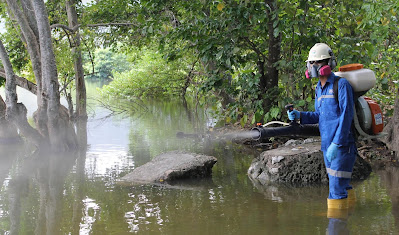Source: International SOS. Fogging of an area likely to harbor malaria-carrying mosquitoes.
In recognition of World Malaria Day 2023 (April 25), International SOS urged organizations to actively participate in the global push for investment, innovation, and implementation to eliminate malaria.
Malaria remains a threat in over 80 countries, leading to more than 240 million infections annually, and this number is increasing, according to International SOS. The World Health Organization reports a surge of 2 million malaria cases globally in 2021 compared to 2020. This upward trend continued in 2022, as per International SOS data, showing a 10% rise in malaria-related assistance requests compared to 2021.
International SOS emphasizes the heightened need for malaria protection, particularly for individuals who might have been exposed due to the resurgence of international business travel. Business travelers should be vigilant about malaria as a possible health concern. Initial symptoms often include fever, headaches, and chills.
The resumption of global travel also raises the risk of reintroducing or increasing malaria transmission in tropical and temperate regions that have successfully eliminated or controlled it.
Dr. Irene Lai, Medical Director at International SOS, advises, “It’s crucial for every organization to evaluate the malaria risk their employees face and implement protective measures." This includes educating employees, pre-travel medical checks, providing preventive resources, and ensuring access to prompt diagnosis and treatment for those traveling to areas with malaria. Organizations operating in malaria-endemic regions should extend these efforts to surrounding communities through comprehensive malaria control programs.
Dr. Dave Knight, a medical doctor and Malaria Specialist at International SOS, notes, “Malaria cases and fatalities have unfortunately risen during the pandemic, and we’ve globally lost some ground in controlling it. Malaria remains a significant health concern for the private sector operating in the tropics, especially in Africa, Asia, and South America, and climate change could worsen this risk.”
Dr. Knight adds, “Significantly reducing this risk for workforces in the next few years is unlikely due to the absence of groundbreaking technological solutions. We must rely on established interventions. However, there’s good news. The new RTS,S vaccine is being introduced in high-transmission areas in Africa for infants and young children. While not yet suitable for adults, it offers vital moderate protection to young children. Where possible, the private sector should support this initiative within the communities they operate in.”
International SOS recommends business travelers conduct a pre-travel risk assessment of their destination and familiarize themselves with malaria symptoms. For those traveling to malaria-prone areas, mitigation strategies include choosing appropriate accommodations and knowing how and when to use emergency standby medication. Here’s a breakdown:
Evaluate the workforce’s malaria risk, and if operating in affected areas, establish a comprehensive malaria control program.
Educate employees on malaria risks and the importance of personal protection against mosquito bites using the ABCDE approach.
Awareness: Be aware of the risks and symptoms.
Bite prevention: Prevent mosquito bites.
Chemoprophylaxis: Take prescribed antimalarial medication to prevent infection.
Diagnosis: Immediately seek diagnosis and treatment if a fever develops a week or more after being in a malaria-affected region.
Emergency: Carry an emergency standby treatment (EST) kit if available and recommended.
Provide preventive supplies, including insect repellent and antimalarial medication.
Offer pre-travel medical consultations and destination travel risk assessments to employees traveling to regions with malaria.
Ensure traveling employees opt for accommodations with bed nets, air conditioning, and screened doors and windows.
International SOS also provides consulting services encompassing all aspects of a company’s malaria risk reduction program. This includes expert entomology consulting, assessment and design of vector control programs, employee education through e-learning, medical consulting to ensure appropriate diagnosis and treatment procedures, data management, and ensuring effective program management.
Explore
Watch the short video at https://vimeo.com/798944207.
*2020 OECD figures state that malaria-endemic countries in Asia Pacific include Papua New Guinea, Solomon Islands, Pakistan, India, Nepal, the Philippines, Indonesia, Myanmar, the Lao PDR, Cambodia, Thailand, DPR Korea, China, Vietnam, Bangladesh, the Republic of Korea and Malaysia.
